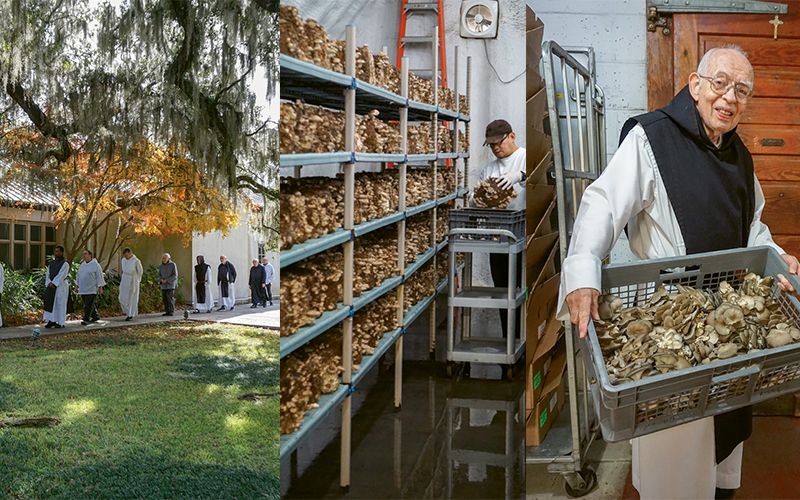Mepkin Abbey’s monks get oyster and shiitake mushrooms into the hands of the city’s top restaurants

(Left to right) The monks of Mepkin Abbey on their way to dinner; Brother Gerard Jonas Palmares harvests oyster mushrooms in the grow house; Brother John Corrigan heads for the cooler.
“Mushrooms wait for no one,” says Mepkin Abbey farm manager Jimmy Livingston. “When they are ready, they must be picked.” Thus, the Trappist monks—who rise daily at four in the morning for vigils, readings, meditations, prayers, and services—dutifully report to the mushroom farm at 9 a.m. and again at 2 p.m. to tend to their ever-growing crops of fungi.
Two long grow houses hug the edge of a field on the sprawling property that fronts the Cooper River roughly an hour northeast of Charleston. There, the monks hand-pick, clean, and trim their crop for market, twice a week shipping 100 cases each of oysters and shiitakes to local distributor Limehouse Produce, which delivers the delicacies to eager chefs.
Mepkin’s booming specialty mushroom operation, spearheaded by Brother John Corrigan, launched 10 years ago as a means of helping fund the monastery, its grounds, the care of its elder residents, and its charities of choice. “It’s in our Constitution that we should support ourselves by the work of our hands,” explains Brother John. “If you live in your head 100 percent of the time, there is something out of balance.”
Since Mepkin Abbey’s founding in 1949, the monks have remained faithful to agricultural traditions, starting with dairy cows, then cattle, then chickens and eggs, and now mushrooms—which require far less heavy lifting than earlier ventures. Plus, mushrooms are very quiet, in harmony with the meditative spirit of the grounds.
Visitors can purchase bags of dehydrated ’shrooms (just add water) at Mepkin’s welcome center. Sometimes the goods appear on grocery store shelves, if demand is sufficient for Whole Foods or Harris Teeter to stock them (hint, hint). Otherwise, you can count on devoted locavore restaurants to feature them; for example, chef Will Fincher developed The Obstinate Daughter’s signature kale, mushroom, parmesan, and egg plate to showcase the intensely flavorful product.

Oyster mushrooms grow in a special substrate.
Fungi Facts
How the monks cook up their own mushrooms, and more
1. Oyster mushrooms are difficult to grow, very sensitive to lighting, temperatures, humidity, pests, and pollen. The brothers experienced plenty of failure at first. Now, with farmer Jimmy Livingston’s advice, plus proprietary technology, success rates are high.
2. Following a vegetarian diet, the monks enjoy their own mushrooms in dishes like quiche, fettuccine, and potato-leek-Gruyère mushroom gratin (find recipes at mepkinabbey.org).
3. The monks are great recyclers, starting with agricultural waste used in their mushroom-growing mix and ending with the creation of their own mushroom compost, available for sale.